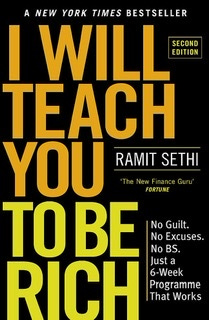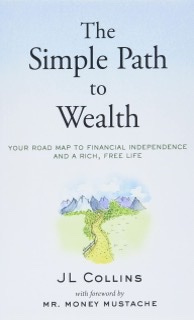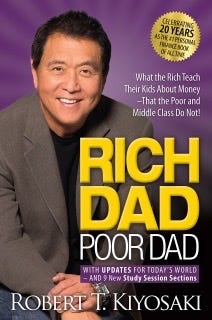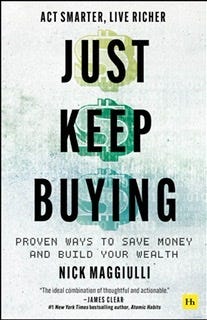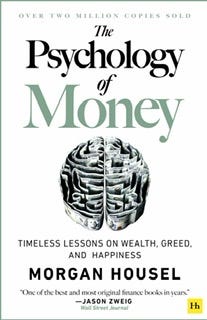5 Must-Read Books
Sometimes you have to spend money to make money
I love to read. Even when I was two years old, my mom would find me reading (you can fact-check her if you don’t believe me). Now, you can find me often absorbing 2-3 books at a time, including an audiobook for the gym or long runs. With each new book I read, whether enjoying it or not, I find a few golden nuggets I take with me and apply to various areas of my life. Finance happens to be one of my favorite genres, which I know might not be everyone’s cup of tea. Even if it is, there are so many finance novels out there that it can be hard to tell which ones are trustworthy, keep your interest, or right for where you are in your financial journey. That’s why I thought I’d lay out the 5 personal finance books that have made the greatest impact on me. I happen to highly recommend all of these, regardless of where you are in your personal finance journey.
I’m always looking for new book recommendations, so drop your favorites in the comments below!
And without further ado, here are my 5 recommended reads for personal finance:
I Will Teach You To Be Rich - Ramit Sethi
This is the first book that got me into the topic of personal finance and has laid the foundation for my own handling of money. An amazing book for personal finance beginners or experts, Ramit Sethi gives a clear formula for wealth: automate everything (like automatic transfers to online savings accounts), so that you can master your money and get on with your life. Obviously, there is some homework he gives you in order to achieve this, but the methods he lists are simple to understand and recreate.
My takeaway: I can’t say enough about this book. Between automating my transfers to an online savings account and Roth IRA, to helping identify my personal money dials that I can spend guilt-free on while cutting ruthlessly in the areas that don’t matter to me, this book transformed my view of money. This is the book that taught me many of the money management habits I practice today that will carry me through a lifetime.
The Simple Path to Wealth - JL Collins
If I Will Teach You To Be Rich is the foundation to my personal finance home, then The Simple Path to Wealth is the pillars. JL created this book from a series of letters he wrote to his daughter about managing money and investing, using it as a way to talk about the core principles of wealth-building. There is a strong emphasis on understanding money and being able to utilize it, rather than choosing to be ignorant of it. Rather than thinking money topics are taboo to discuss or “too difficult”, instead think about it as a tool that can change your future and generations after. Choosing to not understand the fundamentals is what gets so many of us in trouble. JL really digs into ideas that any other author would choose the complex way to illustrate, but he really does stay true to his core: creating wealth can be simple.
My takeaway: I bought this book during a period of financial worry. I was so deep into reading articles, making what-if scenarios in Excel, and trying to optimize every area of my personal finance life. I was starting to question if what I was doing was the right thing for our future. Sometimes you get so into financial reading that you forget your core foundations. This book was the slap in the face that it isn’t that difficult to create a financial plan; I was majoring in the minor. Actually, with a little discipline and knowledge, it can be quite easy (contrary to what many will say). The basics of low-cost investing into index funds, eliminating debt, saving for an emergency fund, and gaining financial knowledge are my core principles today. Those principles stem from reading this book. This book spurred the idea of me “Simplifying” my money.
Rich Dad, Poor Dad - Robert Kiyosaki
This is a classic title that many will recognize, whether having read or not. Robert uses his upbringing with his biological father (his poor dad) and the father of his friend (his rich dad) to show the differences in mindset concerning money. It’s the tale of opposites: his poor dad is highly educated as a college professor, but never feels he can make more money and is not financially secure. His rich dad, meanwhile, is financially educated and sees no limit to how much one can earn, growing wealth through his entrepreneurial mindset.
My takeaway: The book teaches a few key themes that I took away for my own financial journey: financial intelligence, using money to make more money through the use of income-producing assets (think real estate and stocks), and having a financially secure mindset — all of which are only gained through experience. Reading this book reinforced the idea that wealth-building takes time and hard work! But, if you have that financial intelligence, and do the work in the areas that have historically proven to build wealth (again think real estate and the stock market) you can change the course of your life.
Just Keep Buying - Nick Maggiulli
The author of another great finance blog, Of Dollars and Data, Nick uses his data research skills to answer the common questions many of us have: when can we retire, how much should we invest, and can I buy that TV, home, or car I’ve been wanting? Nick uses historical trends to show how staying invested in the market is key, we might not need as much in retirement as we think, and that there is a way to spend guilt-free. This book is great for the data nerds like me, who like charts and graphs, but also need a little reassurance that we can save, invest, and spend.
My takeaway: One spending strategy I really loved in this book is the 2x rule, which says that if you want to splurge on something, you should take the same amount you’re going to spend and invest that into an income-producing asset, or donate it. As an example: If I want to spend $200 at Lululemon, I would have to also contribute $200 towards buying an index fund or donate it. This has helped me reframe if I really want something. If I do, I can buy it guilt-free knowing I’m benefiting my future as well.
The Psychology of Money - Morgan Housel
This one is a tough read, and by that I mean it will challenge you and make you introspective — which I ended up needing. Morgan uses 19 stories to showcase how our emotions, and society’s impact on us, can drive our behavior with money. He stresses looking inward at our own financial beliefs, looking back at our upbringing in regards to money, and being honest with ourselves in how we view money today. Are we buying something because we want or need it, or because it’ll impress those around us? I enjoyed this book because it reveals how money isn’t just about our investment or spending habits, but rather sheds (sometimes brutal) light on why we choose to do the things we do with money, and even ways to course-correct if you feel you are on the wrong path with your finances.
My takeaway: Reading this made me think about the environment I had around me concerning money. How did those close to me think and speak about finances? I realized many of the same worries I have today stemmed from those early times. One example is how I often worrying I’m not saving enough. Long-term saving wasn’t a priority growing up, but rather making sure all the bills were paid. Not that this is wrong, but there wasn’t balance, and the future was always viewed with worry. Today, I prioritize saving and investing, yet never feel I’m doing enough and often worry I won’t have enough saved.
Housel’s book showed me how to make these connections, while also being inquisitive enough to ask if these are the right ways of thinking for myself today. If not, how can I make adjustments for a better relationship with money? This renewed approached of taking stock (no pun intended) of my relationship with money can be attributed to this book, as tough as it may be sometimes.


